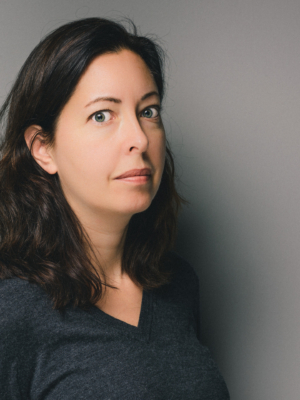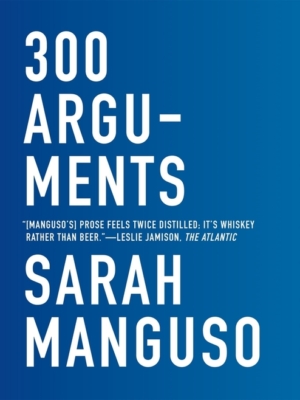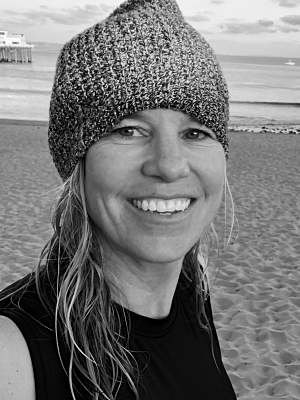Sarah Manguso, Author

Photo Credit: Joel Brouwer
Sarah Manguso has emerged as one of the most unflinching and imaginative self-portraitists. Formally a poet, Manguso’s three most recent books of nonfiction—The Guardians, Ongoingness: The End of Diary, and 300 Arguments—delve deeply into personal subjects: a close friend’s suicide, the personal diary she has kept for over twenty-five years, and, lastly, a collection of aphorisms, or arguments, that explore the big themes of the human condition in a highly succinct fashion. In all of Manguso’s works of nonfiction there is a premium on awareness and awareness of self, that writing is first and foremost an act of paying acute attention.
Her seminar at the Antioch Spring/Summer 2019 MFA residency was titled “Life Writing: The Nothing that is a/k/a Writing About Almost Nothing.” For a portion of the class, the students were asked just to sit in silence but full awareness, and then asked to write about that “empty” time. As an antidote to the slew of memoirs about rare and exciting experiences, Manguso wanted to open us up to what is possible for anyone (most everyone) who hasn’t faced one hundred days adrift at sea or nearly died on the upper reaches of Mount Everest. Just be alive and pay attention and get it down—your wholly unique experiences and perspective as a person who is, for a brief time, on this earth—what you hear, see, think, and feel. Just that can be thrilling. And it is enough.
Sarah Manguso is the recipient of a 2003 Hodder Fellowship from Princeton University, the 2007 Joseph Brodsky Rome Prize Fellowship, and a 2012 Guggenheim Fellowship in General Nonfiction. As well as her seven published books, including two collections of poetry, her writing has been published in Harper’s, the London Review of Books, the New York Review of Books, the New Yorker, and the Paris Review, among others.
She was kind enough to answer my questions via email in August 2019.
* * *
Just a taste of Sarah Manguso’s latest, 300 Arguments:
“The will can achieve some things, but one must exhaust one’s will in order to learn which things they are.
I wish someone would tell me what I should be doing instead of this, that he’d be right, and that I’d believe him.
Sometimes ill-informed choices have good outcomes.”
* * *
Liz Netto: You’ve said that 300 Arguments came about while you were “playing hooky” on writing a much longer book about growing up in Boston and racism. When did you decide that this side project was something you wanted to explore more in depth? How did you go about ordering them and compiling them all together? Did the various themes leap out at you or did you spend a lot of time trying to find the categories?
Sarah Manguso: After I had about 200 of them, I thought I could plump up the collection into a book. And I came up with the themes while waiting for a job interview at the Otis College of Art and Design, where I later taught. I’d gotten there about half an hour early from way across town, and had brought the manuscript in case that happened. The pieces were in alphabetical order at that point, and I sat at a cafeteria table and quickly threw down some key words next to them. I started out with twenty or so, and then boiled them down to their essential number, which was seven.
LN: Did you have any inspirations for writing the arguments—love of Dorothy Parker, or John Stuart Mill, Jenny Holzer, Oscar Wilde, or Confucius?
SM: Holzer was an inspiration—her Truisms prints hang all around our house. I also love James Richardson’s book Vectors, which has been a guiding light for me since it was published in 2001. Add to those all the lines from books and film and people and letters and everything that has lodged itself in me since the beginning.
“Notice what’s here, love what’s here. Because it will all be gone, and you’ll be gone, too. Everything worth doing, worth loving, flies swiftly to its grave.”
LN: When you were compiling these arguments, did you ever toy with or think of reworking them to be something different? Like more like essays or to combine some?
SM: No way. I loved the smallness of them. That was their entire allure, the smallness.
LN: As for bigness, there’s your diary about which you write in your book Ongoingness. I was fascinated with the urgency with which you wrote in your diary, that somehow getting things down, this obsessive self-documentation, would save you from “getting lost in time” and produce “an authentic record” of your life. As I was reading about your practice of diary writing, at times it seemed like a psychological release valve for anxious rumination, at times a philosophical project on time, memory, and existence, and at times a spiritual practice. You say, “I wanted to comprehend my own position in time so I could use my evolving self as completely and usefully as possible. I didn’t want to go lurching around, half-awake, unaware of the work I owed the world, work I didn’t want to live without doing.” How does awareness—this paying attention—play a part of the work you feel you owe the world?
SM: I don’t want to miss what’s here and not to be missed. And everything is like that! Notice what’s here, love what’s here. Because it will all be gone, and you’ll be gone, too. Everything worth doing, worth loving, flies swiftly to its grave.
LN: How and when did you decide the format for Ongoingness? Your own diaries play a crucial part, so did you ever think to make it a straight diary-format?
SM: The book is an essay about my diary, not a diary. I had no intention of publishing my diary. From the beginning of the project, I was adamant about keeping the book and the diary distinct.
“My existential worries about losing and forgetting dissipated immediately once I could see that the diaries were neither necessary nor sufficient. It freed me up to think about other things.”
LN: I thought a lot about Proust and Knausgaard while reading Ongoingness, probably because they also both engage deeply with memory and time. Those projects though are multi-volume enterprises while Ongoingness is extremely concise. The diary on the other hand, at over 800,000 words, has perhaps something more in common with them. Were you intending Ongoingness, in its brevity and economy, to be a counterweight to the many words of the diary or did it just turn out that way? Is succinctness something you strive for in all your work?
SM: Writing succinctly is something I enjoy. If I enjoyed writing long books, I’d write those. God knows I’d get paid more. The diary is long, but it too is succinct. I’ve been writing it for almost thirty years.
LN: Halfway through Ongoingness, you become pregnant and then a mother. Immediately, your perception of your relationship with time shifts—no longer do you exist against the continuity of time, fighting time, trying not to drown in time. Instead, and I love this line so much, “the mother becomes the background against which the baby lives, becomes time.” And then a few lines later, “I am no longer merely a thing living in the world; I am a world.” Did motherhood surprise you in how it might have unburdened you of certain preoccupations and fears even if it replaced those with new ones? And as a writer, did it change what you wanted to write about and how?
SM: I write about this in Ongoingness: the shock that, yes, my existential worries about losing and forgetting dissipated immediately once I could see that the diaries were neither necessary nor sufficient. It freed me up to think about other things.
LN: I reread The Diary of Anne Frank on a recent trip to Amsterdam and was so moved by not just the suffering, but how terrific her writing was, something entirely lost on me the first time around in middle school. Do you like reading published diaries? Do you have any favorites?
SM: While reading books about Iowa, as I was preparing to move there, I found the diaries of Sarah Gillespie Huftalen, a farm girl who became a country teacher. She was also a prodigious essayist and poet. Her childhood diaries are amazing: Our little colty died. Pa cried. Turks peep. Strawberrying. She taught me so much. Widening my net, I found that there are no hard rules; sometimes the books really are better (Woolf, Kafka) and sometimes they aren’t (Cheever, Renard).
LN: In The Guardians, an elegy for a friend who committed suicide, you wrote, “I traded poetry for a longer life.” What did you mean by that? Do you think poetry and the writing of it, the craft of it, still informs your work?
SM: In that passage, I literally meant that going on antipsychotics in 1999 removed my urge to write poems, and once I realized that, I made the conscious choice to let the poems go. I didn’t trust my unmedicated self to stay alive.
“Don’t write toward a form. Let the work assume its form.”
LN: You’ve been quite frank about the fact that your writing doesn’t “pay the bills.” That has only become more true since having a child, I imagine. What is a writer and a mother/writer to do in our fierce capitalist and patriarchal society other than “learn to live on air” and oatmeal per your suggestion?
SM: Currently, the only solution is to be exceptional, to work more than anyone should have to. But you can leave your work aside sometimes and join those who are working toward building a more humane society for everyone.
LN: How does teaching add to your writing and what does it drain from it?
SM: In simplest terms, it adds money and subtracts time. In more complex terms, teaching both borrows from and adds to the arena of thought that gives rise to my own writing. It’s an open secret that thinking out loud and on the page, in response to students, is a wonderful proving ground for nascent work.
LN: Are you back writing the longer book? What are you doing now?
SM: I’m writing a novel, and alongside it, doing the trillion other writing-adjacent and miscellaneous things that writers and teachers and mothers do.
LN: What would you say is the biggest difference for you as you write longer works and shorter works? Or have you not found many differences because it’s just about getting it out and on the page?
SM: Everything I write declares its own form at some point.
LN: What is your writing ritual life? Do you have a set time every day to write, or is it more like grabbing some time when you can? Has it changed or evolved over the years, especially since becoming a mother?
SM: My kid is still young, so I steal time from the day like a ferret steals eggs.
LN: Do you have any advice or words of wisdom for writers who may be trying to write similarly to the forms you’ve successfully used?
SM: Don’t write toward a form. Let the work assume its form.
LN: Things are quite heavy in the world right now, so what’s something you’re really enjoying?
SM: Raising my kid, loving my spouse, helping those who can use my help.
Liz Tynes Netto is a lapsed journalist, TV producer, and resident of Los Angeles. Her poems have appeared in West Trestle Review, The Mas Tequila Review, The Lummox, Lady/Liberty/Lit, and others. A current MFA candidate at Antioch University in fiction, she is writing a novel.





